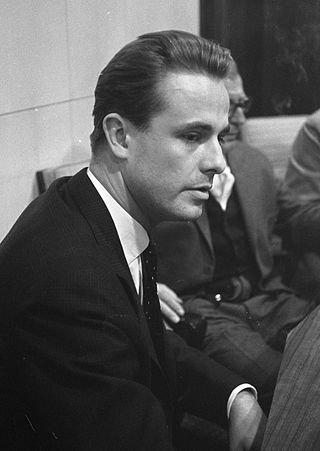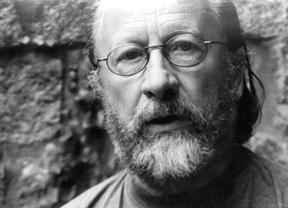
Joachim Hansen was a German actor. He was best known for film roles in the 1960s and 1970s in which he often portrayed Nazi officers and World War II German officials.

Horst Tappert was a German film and television actor best known for the role of Inspector Stephan Derrick in the television drama Derrick.
Paul Godwin (1902–1982) was a violinist and the leader of a popular German dance orchestra in the 1920s and 30s.

Kommune 1 or K1 was a politically motivated commune in Germany. It was created on 12 January 1967, in West Berlin and finally dissolved in November 1969. Kommune 1 developed from the extraparliamentary opposition of the German student movement of the 1960s. It was intended as a counter-model against the small middle-class family, as a reaction against a society that the commune thought was very conservative.

Ursula "Uschi" Obermaier is a former fashion model and actress associated with the 1968 left-wing movement in Germany. She is considered an iconic sex symbol of the so-called "1968 generation" and the protests of 1968.

Ireen Sheer is a German-English singer. She had her first major hit in 1970 with Hey Pleasure Man. She had a top five hit on the German singles chart with "Goodbye Mama" in 1973. She went on to finish fourth at the Eurovision Song Contest 1974 representing Luxembourg, sixth at the Eurovision Song Contest 1978 representing Germany, and thirteenth at the Eurovision Song Contest 1985 representing Luxembourg again.
Die Flippers were a German Schlager group formed in 1964. They were one of the most successful Schlager groups of all time, and have been constantly recording and releasing new music since their self-titled debut album was released in 1970. They have released 45 albums, 5 of which have gone platinum, 24 gold. They have won 11 Goldene Stimmgabel awards in 1988, 1991, 1994, 1995, 1996, 1998, 1999, 2000, 2002, 2003 and 2004.

Georg Katzer was a German composer and teacher. The last master student of Hanns Eisler, he composed music in many genres, including works for the stage. Katzer was one of the pioneers of electronic new music in the German Democratic Republic and the founder of the first electronic-music studio in the GDR. He held leading positions in music organisations, first in the East, then in the united Germany, and received many awards, including the Art Prize of the German Democratic Republic, the National Prize of the German Democratic Republic, the Order of Merit of the Federal Republic of Germany, and the German Music Authors' Prize.

Barbara Rütting, also known as Barbara Ruetting was a German film actress, politician, author and vegetarianism activist. She appeared in 50 films between 1952 and 1979.
Rosalie Helga Lina Zech, known as Rosel Zech, was a German theater and film actress, she is most well known for her works associated with the "Autorenkino" movement, which began in the 1970s.

Elke Heidenreich is a German author, TV presenter, literary critic and journalist. She has written audio plays, a magazine column, scripts for television plays and books. Heidenreich is known as the Kabarettist who created a character, Else Stratmann. She is a literary critic in the television Literaturclub of the Schweizer Fernsehen.
Christa Reinig was a German poet, fiction and non-fiction writer, and dramatist. She began her career in the Soviet occupation zone which became East Berlin, was banned there, after publishing in West Germany, and moved to the West in 1964, settling in Munich. She was openly lesbian. Her works are marked by black humor, and irony.

Gerhard Zwerenz was a German writer and politician. From 1994 until 1998 he was a member of the Bundestag for the Party of Democratic Socialism (PDS).

Jutta Lampe was a German actress on stage and in film. She was for 30 years a leading actress at the Schaubühne founded in Berlin by her husband Peter Stein, where she played both classical theatre such as Alkmene in Kleist's Amphitryon, and world premieres including Robert Wilson's Orlando for one actor, and roles that Botho Strauß created for her. She was also engaged at the Vienna Burgtheater and the Schauspielhaus Zürich. She appeared in more than twenty films from 1963, including lead roles in films by Margarethe von Trotta. Lampe was named Actress of the Year by Theater heute several times. Other awards included the Gertrud-Eysoldt-Ring and the Joana Maria Gorvin Prize for her life's work.

Anna Werner is a German photographer. She is, in particular, known for her membership of Der Harem - described variously as a "virtual commune" or a "self-discovery group" - around Rainer Langhans.

Christa Luft is a German economist and politician of the SED/PDS. Luft joined the SED in 1958. From 18 November 1989 to 18 March 1990, she was the Minister of Economics in the Modrow government. From 1994 to 2002 she was member of the Bundestag for the PDS.
Waldtraut Lewin was a German writer, dramaturge and stage director.

Gisela Martine Getty is a German photographer, film director, designer, and author. She is known for her involvement in the German '68-movement, along with her late sister, Jutta Winkelmann.

Uschi Brüning is a German jazz and soul singer and songwriter. She made her career in East Germany and was 42 when the Berlin wall was breached. She has transitioned and sustained her career more successfully than other former East German performance artists post-reunification, though her fan base remains concentrated principally in the east.














